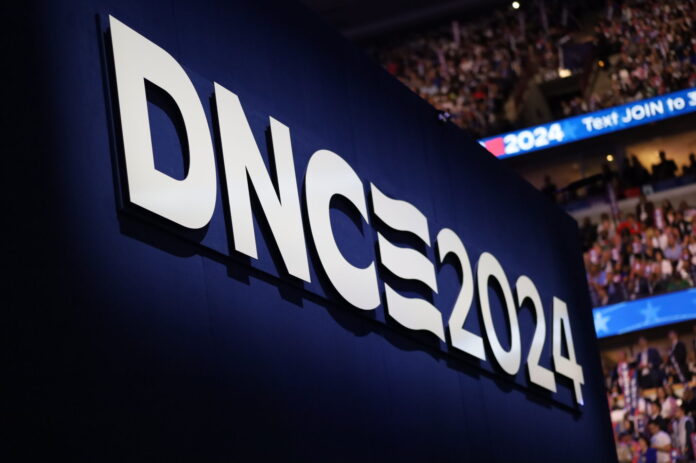CHICAGO — Actor B.D. Wong told the AAPI caucus at the Democratic National Convention on Wednesday what he said to his multiracial son at his bar mitzvah.
“I told him, in front of everybody, ‘You are not half of anything. You are all of everything,’” Wong said. And with the first-ever Asian American nominee of a major political party set to accept her party’s nomination on Thursday, Wong said AAPI people should be proud of that part of Kamala Harris’ identity.
“It is astonishing to me that we characterize her easily as the first Black woman president. A lot of times, the South Asian part, the Asian American part, gets left off the list,” Wong said. “And we really need to own it, and we need to be really proud of it, and we need to perpetuate it and remind people that that is … an incredible thing. And I think in our kind of non-confrontational Asian Americanness, we kind of like let it slide a little bit, but let’s really lean into it.”
Angela Alsobrooks, candidate for U.S. Senate in Maryland, U.S. Reps. Ro Khanna of California and Andy Kim of New Jersey — also a candidate for U.S. Senate — were among the elected Democrats who spoke to the Asian American and Pacific Islander (AAPI) caucus on Wednesday, as they celebrated Harris and what her ascension to the top of the Democratic ticket means for their communities.
“We are in a joyous time where Kamala Harris is bringing us together, reintroducing joy into our country,” Alsobrooks said. “I love what was just said a moment ago about being half of anything, but all of everything. Isn’t that true of all of us?”
But they also spoke about the challenges facing Asian American politicians, describing how they are still stereotyped in their attempts to have a seat at the table.
Kim (D-NJ), the Democrats’ candidate to replace Bob Menendez in the U.S. Senate, told the gathering that Asian Americans are the fastest-growing demographic in New Jersey but, when he started running for Congress six years ago, he was told an Asian American candidate could not win in his district.
“My congressional district was 85% white, less than 3% Asian, that voted for Trump,” Kim said. “They said, ‘Look, if you want to win a seat in Congress, why don’t you move up to North Jersey, where there are a lot more people that look like you.’ That’s what they said to me. But I said, I want to run in my district because it’s my home. I’m not just shopping for a district I can win.”
Kim said he told people who were telling him that — some of whom were Democrats, he added — not to define him by his name and the color of his skin.
“I am as American as anybody is. My story is not just an Asian American story, a Korean American story, it is fundamentally an American story,” he told the gathering, to applause. “And I’m proud that this 85% white district, less than 3% Asian, that voted for Trump twice, has now three times elected a Korean American Democrat to be their voice.”
He hears the same naysayers as he runs his campaign for Senate, Kim added.
“And I said, `Look again, don’t think that I am only a voice for Asian Americans. Don’t just think that I can only speak to those issues,’” he said. He’s tired of only being called on for help when there are instances of Asian American hate, he added.
“Yes, that’s important. Yes, it’s important about affirmative action and other issues that are out there, but what I’ll say is: We have something to say about everything, not just about Asian American issues. We deserve a seat at the table for every single decision being made about this country.”
Khanna (D-California) spoke about Harris, whom he has worked with since her time in California government. “She’s had to break the barriers, and so she knows that we need to break barriers to have other people have a shot,” Khanna said.
He said that the politics of authenticity that Kim spoke about have been used by the Republican candidate for vice president, U.S. Sen. J.D. Vance (R-Ohio), in speaking about his own wife, Usha. In his speech at the Republican National Convention, Vance described how his family had held a cemetery plot of land in eastern Kentucky for seven generations, Khanna said, suggesting that Usha Vance would also be buried there.
“And I’m thinking, you know, Usha Vance is Hindu American like me. Is she going to have a choice in the matter?” Khanna mused. “What upset me about that speech is that Vance was basically implying that the longer you could trace your heritage back, the amount of generations you could trace your heritage, that somehow defined what it means to be an American.”
“When we elect Kamala Harris as president of the United States, we’re going to show that this country is a multiracial democracy where it doesn’t matter how long your lineage is, you can be American. Everyone can be American.”
This story first appeared in the Pennsylvania Capital-Star, a member with the Phoenix in the nonprofit States Newsroom.

